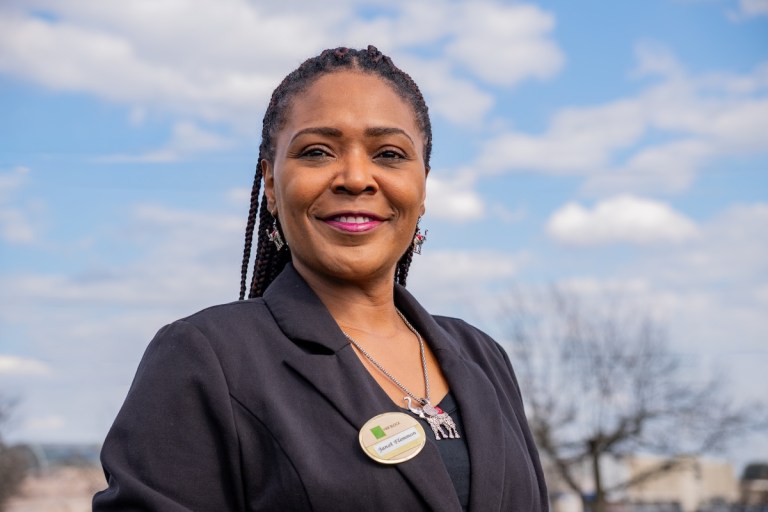Are you a professional woman caregiving during the pandemic? Get help now
Reading time: 7 minutes

We know a lot of working women in Birmingham are juggling many responsibilities right now. Wondering what’s helping some professional women who are also caregiving navigate this time, we reached out to three experts: April Benetollo of Momentum, Gayle Lantz of Work Matters and Delphine Carter of Boulo Solutions. Keep reading to learn what we learned, including strategies and resources that can help anyone.
What’s the issue:

You may have heard that 1 in 4 American women are considering downsizing their careers or leaving the workforce altogether since the start of the pandemic. We searched for resources to help professional women in Birmingham who are also caring for young children and/or aging parents.
Who it affects:
For this story only, we focused on professional women who are juggling caregiving responsibilities, whether for the older or younger generation, and sometimes both.
Why it matters:

According to April Benetollo of Momentum,
“The chronology of a lot of working women’s lives goes like this: the kids hit an age where their extracurricular activities become very demanding at the same time that the grandparents begin to need help.
At the same time, a woman may be at the height of her career potential—an upper-mid-level manager who aspires to go on and do something bigger yet still has a lot to prove.
On top of all that, the pandemic has added a whole level of worry with everything we do. And, we’re not seeing the people we would normally see; we’re not leaving the kids with the grandparents, a sitter or anyone; and we’re not doing our normal self-care.”
What’s working for professional women caregiving during the pandemic
At work, here are some strategies that are helping:
- Communicate directly with bosses and direct reports. (April Benetollo, Momentum)
- Substantial daily updates keep employees visible and accountable to their boss and keep direct reports engaged.
- Slack or other platforms allow people to do quick check-ins and collaborative work.
- Project-based work can provide a flexible alternative to leaving: sometimes people think the only options are full-time or nothing. Fortunately, there’s another option. Businesses are now open to hiring more flexibly than the standard full-time arrangement. (Delphine Carter, Boulo Solutions)
- Something positive: employers are seeing that people can work well remotely and still get the job done. This may increase employers’ ability or willingness to offer more flexible scheduling and remote work in the future which will benefit working parents across the board. (Benetollo)
At home, strategies that help:
- Engage partners and family more. Stop trying to be the superhero. This means asking for and receiving help and letting go of habitual self-reliance. (Benetollo)
- Regular 1:1 meetings at work and with the kids (assuming they’re not tiny), spouse and/or aging parents at home. This allows for continuous learning and coaching at work, and also ensures that the kids and other family members get the time and support they need. (Sharron Swain, Bham Now)
- Sleep is essential. This is where the repair happens in our bodies and minds. (Benetollo)
- Use services: order groceries online or takeout sometimes. Some care professionals are making house calls now (e.g. massage therapists, hairdressers, chiropractors). (Benetollo)
- One benefit: spouses are seeing what wives do both at work and in the home. This leads to greater respect for just how much a woman gets done in a short period of time. If both spouses are at home, everybody gets a mutual understanding of the other’s workload. (Benetollo)
Both, strategies that work at home + at work:

- A proactive, “I can figure this out” attitude: this helps you look for opportunities instead of seeing only what they can’t do. (Gail Lantz, Work Matters)
- Staying grounded, accepting what’s happening and thinking through what’s next (vs. fighting against what is). (Lantz)
- An unapologetic stance (for both women and men): for example, letting people know there are children at home who may be making noise in the background or canceling a meeting in order to prioritize a milestone in their child’s life. The same goes for men and women needing to take care of aging parents. (Lantz)
- Shifting from work-life balance to the Life Elements Blend, as designed by organizational psychologists Dr. Julie McDonald and Dr. Lisa Graham—this is where you define your most important values and organize your work and life in a way that works for you.
- One benefit: this time is helping to break down barriers between people’s personal and professional lives, and shows how everyone is human. Greater sensitivity in the workplace may lead to more integrated and compassionate work cultures in the future. (Lantz)
Where women can get support
Momentum:
- Intentional Tuesdays + Wellness Wednesdays —women have told Benetollo this is “helpful, insightful content—inspirational and educational”
- Momentum Matters Podcast—which provides “a sense of community with other women professionals”
Work Matters:
- CEO on the Go—a weekly podcast where Gayle Lantz explores personal and professional growth for busy leaders.
Boulo Solutions:

According to their website, “Boulo is your bridge to flexible work options at companies who respect work-life balance.”
- Build a 360-degree profile of yourself on Boulo’s platform. This free, no-obligation questionnaire was designed by a psychologist to focus on who you are as a person—not just your resume. The only requirements: undergrad degree and 3 years experience or over 8 years experience in a specific field.
- Common matches: bookkeeping, marketing, financial services, project management, admin.
- You tell what your dream situation would be. Boulo reaches out when they’ve got a fit.
- Boulo shares your profile with businesses if there is a fit. The business sees the woman in a different light compared to a typical resume.
- If it’s a fit on both sides, they put the woman and the company together and they take it from there.
Other:
- Virtual groups where women are talking about these issues, no matter the initial focus of the group. I’m a big fan of Psychology at Work, run by Dr. Julie McDonald and Dr. Lisa Graham.
- Burnout: this book, highly recommended by Delphine Carter, may be required for everyone in 2021. The main idea: how you close the stress cycle instead of moving from one stressor to the next. Don’t have time to read a book? Check out this podcast where the authors talk with Brene Brown.
- Transforming Success: a virtual leadership development program for people at all stages of their careers, led by Dr. Julie McDonald and Dr. Lisa Graham.
The bottom line
If you’re a working professional woman who’s juggling too many balls right now, you’re not alone and there is support.





